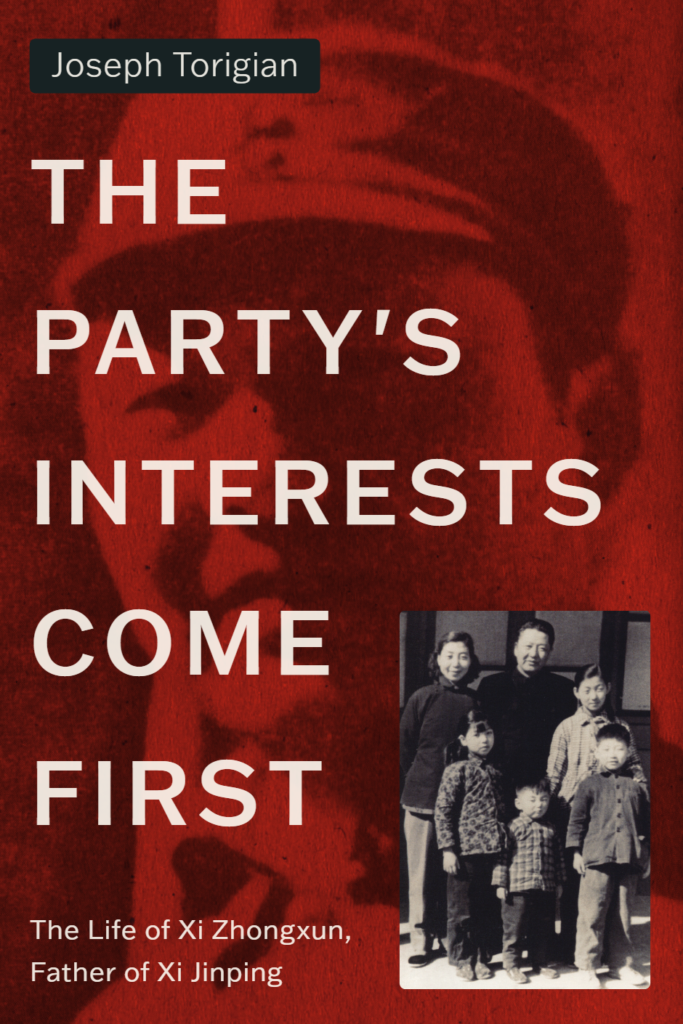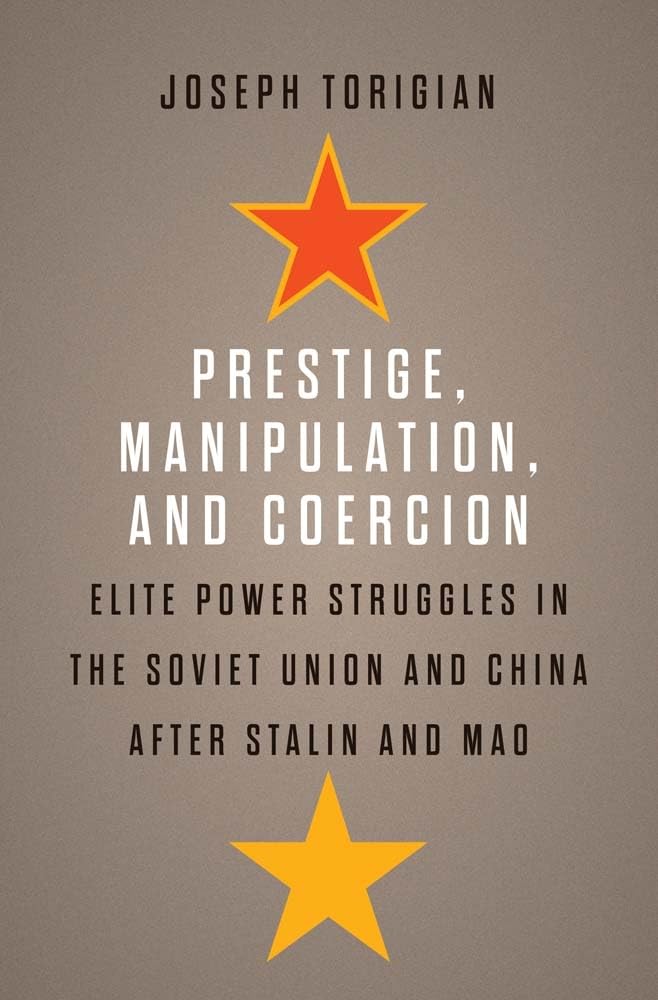Books
The Party’s Interests Come First: The Life of Xi Zhongxun, Father of Xi Jinping

China’s leader, Xi Jinping, is one of the most powerful individuals in the world―and one of the least understood. Much can be learned, however, about both Xi Jinping and the nature of the party he leads from the memory and legacy of his father, the revolutionary Xi Zhongxun (1913–2002). The elder Xi served the Chinese Communist Party (CCP) for more than seven decades. He worked at the right-hand of prominent leaders Zhou Enlai and Hu Yaobang. He helped build the Communist base area that saved Mao Zedong in 1935, and he initiated the Special Economic Zones that launched China into the reform era after Mao’s death. He led the Party’s United Front efforts toward Tibetans, Uyghurs, and Taiwanese. And though in 1989 he initially sought to avoid violence, he ultimately supported the Party’s crackdown on the Tiananmen protesters.
The Party’s Interests Come First is the first biography of Xi Zhongxun written in English. This biography is at once a sweeping story of the Chinese revolution and the first several decades of the People’s Republic of China, and a deeply personal story about making sense of one’s own identity within a larger political context. Drawing on an array of new documents, interviews, diaries, and periodicals, I tell the life story of Xi Zhongxun, a man who spent his entire life struggling to balance his own feelings with the Party’s demands. Through the eyes of Xi Jinping’s father, this book reveals the extraordinary organizational, ideological, and coercive power of the CCP―and the terrible cost in human suffering that comes with it.
The Party’s Interests Come First: The Life of Xi Zhongxun, Father of Xi Jinping will be published in June 2025 with Stanford University Press.
Prestige, Manipulation, and Coercion: Elite Power Struggles in the Soviet Union and China after Stalin and Mao

My first book, Prestige, Manipulation, and Coercion: Elite Power Struggles in the Soviet Union and China after Stalin and Mao, was published at Yale University Press in April 2022.
It asks the question: how do leaders win power struggles in Leninist regimes? Many political scientists emphasize the importance of institutions in such regimes. Such institutionalization allegedly provides a mechanism for distributing patronage and debating policies, stipulates rules that delineate a group that selects the leadership, and prevents the military and secret police from playing a special coercive role. This book manuscript instead argues that the defining feature of one-party states is weak institutionalization. Power struggles are therefore determined by prestige and sociological ties, the manipulation of multiple decision-making bodies, and politicized militaries and secret police. Leaders with legacies as successful warfighters are especially capable of dominating such systems. Institutionalization can only explain why elites do not pointlessly and unnecessarily violate ambiguous rules, losers rarely defect from the party or resist decisions after suffering defeat, and the coercive organs never blatantly wield force against united civilian leaders. These arguments are based on a theoretically rigorous examination of the power struggles fought by Nikita Khrushchev and Deng Xiaoping.
Here are some reactions to the book:
“[Torigian] is less interested in coalitions than the mechanics of transfers. Challenging conventional analyses of how authoritarian leaders are chosen, he argues that factors such as ideology and patronage matter less than brass-knuckle tactics.”—Ian Johnson, New York Review of Books
“Do read Torigian’s Prestige, Manipulation, and Coercion. . . . It’s great.”—Stuart Lau, Politico
“Prestige, Manipulation, and Coercion . . . is . . . useful for those interested in understanding how actors in Leninist systems fight for power.”—Martin Laflamme, Los Angeles Review of Books
“[Torigian’s] ambitious first book re-examines critical junctures in Soviet and Chinese history, putting up a revisionist case against the consensus view of Deng Xiaoping and Nikita Khrushchev as reformers.”—John Delury, Global Asia
“[S]pecialists will find much to ponder in this careful, detailed examination of a critical question in the functioning of authoritarian regimes.”—Mary Elise Sarotte, Engelsberg Ideas
“[A] thought-provoking, rigorous contribution to the literature on elite politics under authoritarianism. . . . This book deserves to be widely read by scholars and students of Soviet and Chinese politics, communism, and authoritarianism in general.”—Cheng Chen, Russian Review
“A careful and systematic comparison of the dynamics of leadership transition in the post-Stalin Soviet Union and post-Mao China.”—Peter Rutland, Political Science Quarterly
“[Torigian’s] work is absolutely outstanding.”—Stephen Kotkin, ChinaTalk
“The book makes a compelling case for the value of Sino-Soviet-Russian comparisons. . . . Must-reading for social scientists. . . . A major achievement.”—Thomas P. Bernstein, China Journal
“Joseph Torigian makes a major contribution to the literature on authoritarian politics.”—Victor Shih, China Quarterly
“There is much to ponder . . . [in] the novelty, analytical rigour and excellence of what is a demanding comparative study.”—S. A. Smith, Slavonic and Eastern European Review
“The best account of the transition from Mao to Hua to Deng is Joseph Torigian’s book Prestige, Manipulation, and Coercion.”—Neil Thomas, Asia Society Policy Institute
“Torigian’s work is a masterclass in archival research as detective work. His ability to piece together a unique set of sources, and to draw them into analytical conversation and historical narrative, are formidable.”—Sheena Chestnut, H-Diplo
“[A] detailed account of the internal battles at pivotal historical moments in two Leninist systems. . . . [Torigian’s] reconstructions of the politics behind ideological debates are impressive.”—Andrew Batson, Tangled Woof (blog)
“Torigian has provided a deeply researched and counterintuitive intervention into both post-Stalin Soviet politics and post-Mao Chinese politics.”—Chris Miller, H-Diplo
“An extremely important book. . . . Its significance lies in the author’s argument that . . . it is not economic/material interests, policy differences, or rules and institutions that determine leadership turnover after the death of a dictator . . . [but] personal interactions among top Party personnel that shape what he terms ‘post-cult-of-personality power struggles.’”—H-Diplo
“It is a treat to read Torigian’s masterful work. . . . He convincingly argues an against-the-grain proof that in post-Stalin Soviet Union and post-Mao China, policy differences were exaggerated and secondary to personal histories and grievances in elite power struggles. Torigian’s twin case studies demonstrate that Leninist political systems are marred by weak institutionalization and a constant struggle over dominance.”—Emily Jin, Center for a New American Security, “Best of 2022”
“Torigian has written a compelling and important book about leadership succession in authoritarian states.”—Brian D. Taylor, H-Diplo
“Joseph Torigian’s stellar research and personal interviews have produced a brilliant, meticulous study. It fundamentally undermines what political scientists have presumed to be the way Chinese Communist and Soviet politics operate.”—Dorothy J. Solinger, University of California, Irvine
“Joseph Torigian combines history and political science in a remarkably acute and innovative study of leadership politics in the Soviet Union and China. It will help us understand authoritarian regimes today.”—David Holloway, Stanford University